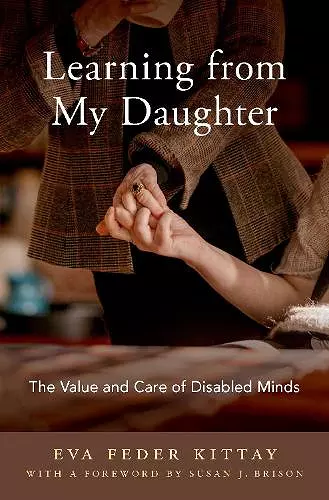Learning from My Daughter
The Value and Care of Disabled Minds
Format:Hardback
Publisher:Oxford University Press Inc
Published:6th Jun '19
Currently unavailable, and unfortunately no date known when it will be back

Winner of the 2020 PROSE Award for Excellence in Philosophy by the Association of American Publishers
Through personal narrative and philosophical argumentation, Eva Feder Kittay relates how raising a multiply-disabled daughter has altered her views on what matters and gives meaning in life. She explores such difficult topics as the desire for normalcy, reproductive technology's promise that we can choose our children, the importance of care, and the need for an ethic of care.Does life have meaning? What is flourishing? How do we attain the good life? Philosophers, and many others of us, have explored these questions for centuries. As Eva Feder Kittay points out, however, there is a flaw in the essential premise of these questions: they seem oblivious to the very nature of the ways in which humans live, omitting a world of co-dependency, and of the fact that we live in and through our bodies, whether they are fully abled or disabled. Our dependent, vulnerable, messy, changeable, and embodied experience colors everything about our lives both on the surface and when it comes to deeper concepts, but we tend to leave aside the body for the mind when it comes to philosophical matters. Disability offers a powerful challenge to long-held philosophical views about the nature of the good life, what provides meaning in our lives, and the centrality of reason, as well as questions of justice, dignity, and personhood. These concepts need not be distant and idealized; the answers are right before us, in the way humans interact with one another, care for one another, and need one another--whether they possess full mental capacities or have cognitive limitations. We need to revise our concepts of things like dignity and personhood in light of this important correction, Kittay argues. This is the first of two books in which Kittay will grapple with just how we need to revisit core philosophical ideas in light of disabled people's experience and way of being in the world. Kittay, an award-winning philosopher who is also the mother to a multiply-disabled daughter, interweaves the personal voice with the philosophical as a critical method of philosophical investigation. Here, she addresses why cognitive disability can reorient us to what truly matters, and questions the centrality of normalcy as part of a good life. With profound sensitivity and insight, Kittay examines other difficult topics: How can we...
Kittay provides an excellent read in disability theory and philosophy and offers clarity and persistence in addressing very tough questions. * Jana M. Bennett, University of Dayton, The National Catholic Bioethics Quarterly *
Learning From My Daughter has much to recommend it. Kittay is, as always, incisive, and Learning From My Daughter is both eloquently argued and replete with hard-won insight. It ought to attract a wide readership both within and beyond the academy. * The Philosophical Quarterly *
Eva Feder Kittay's is a thought-provoking book on humility, choosing children, and the place of care in philosophy and disability. It recently [2020] won the prestigious PROSE Award for Philosophy. This book deserves a wide readership both in and beyond philosophy...it will constitute a significant resource for philosophers of disability and philosophers more generally. * Robert A. Wilson, University of Western Australia, Notre Dame Philosophical Reviews *
Eva Feder Kittay's Learning from My Daughter is, in my view, her best work to date. As I read, I felt I was being guided through a varied terrain — some of it familiar, some unfamiliar — by someone who is much wiser than I am. Kittay's experience — of loving and caring for both a daughter with severe cognitive and physical disabilities and a son who is not disabled motivates and informs the book in crucial ways, while her philosophical mastery allows her to think through and convey with clarity the insights that this experience yields. * Lisa Tessman, APA Feminism and Philosophy Newsletter *
Very few philosophers since Plato have thought about disability so productively and generatively as has Eva Kittay. And very few scholars of disability have so enriched the study of philosophy as has Eva Kittay. Learning from My Daughter is a remarkable book, one that I know I will return to again and again in my intellectual journeys. It should be required reading for anyone who wants to think seriously about what makes us human. * Michael Bérubé, Edwin Erle Sparks Professor of Literature, Pennsylvania State University *
Eva Kittay's work on disability is at once both philosophically astute and deeply moving. She writes with the skill of a careful thinker and the passion of a mother, and her perspective on disability is invaluable. * Elizabeth Barnes, Professor of Philosophy, University of Virginia *
The advent of a new book from Eva Kittay fills me with gratitude and excitement: the clarity of her thinking and the wisdom of her heart mean that these arguments will be welcomed, puzzled over, disputed with, and treasured for many years to come. * Tom Shakespeare, Professor of Disability Research, London School of Hygiene and Tropical Medicine *
- Winner of Winner of the 2020 ^IPROSE^R Award for Excellence in Philosophy by the Association of American Publishers.
ISBN: 9780190844608
Dimensions: 239mm x 165mm x 33mm
Weight: 522g
304 pages